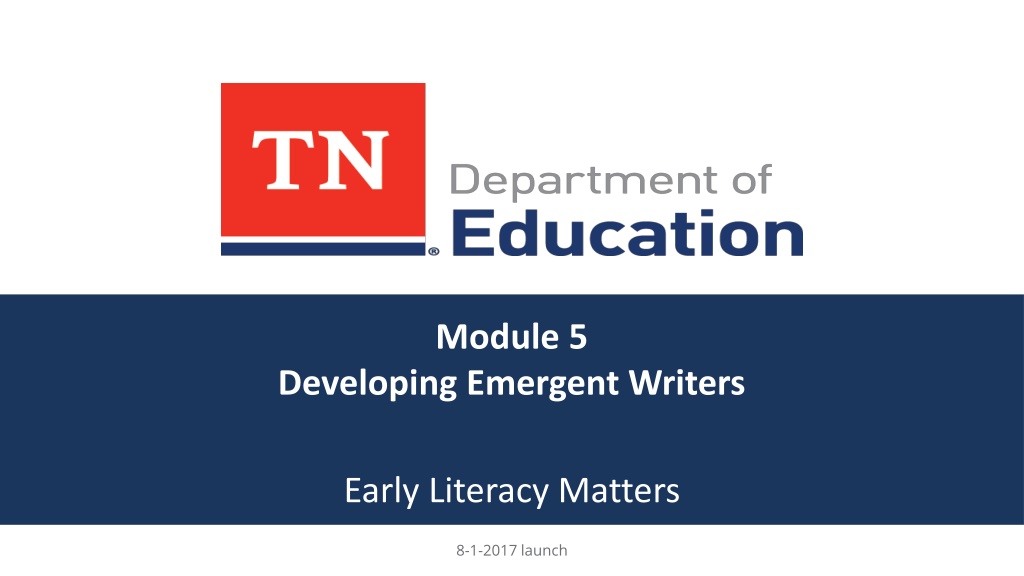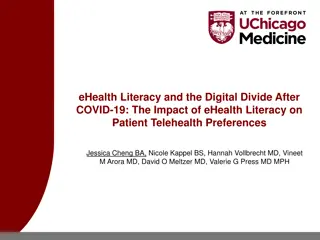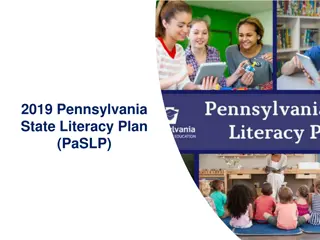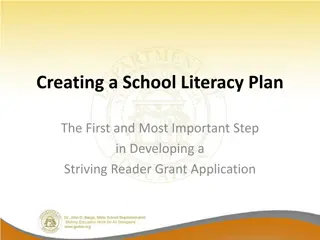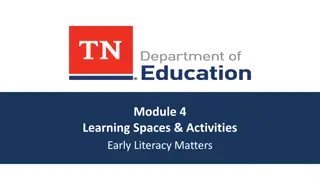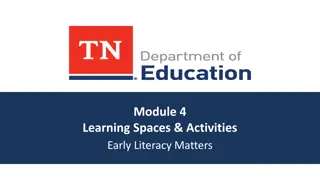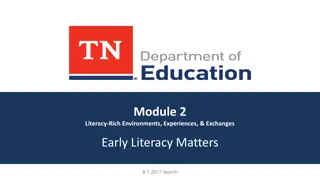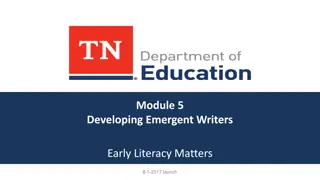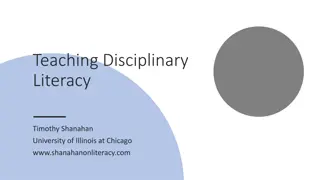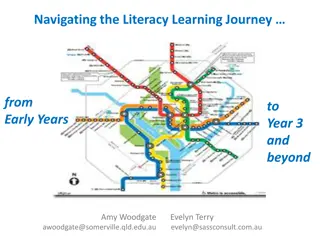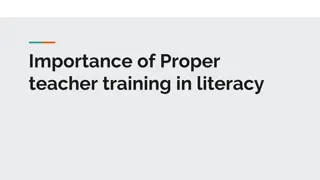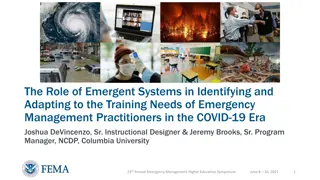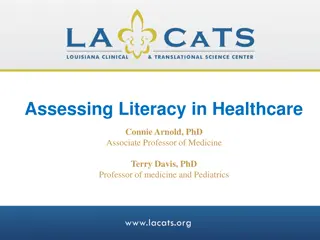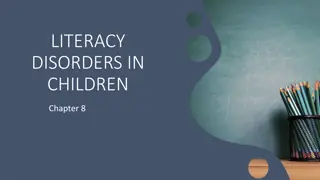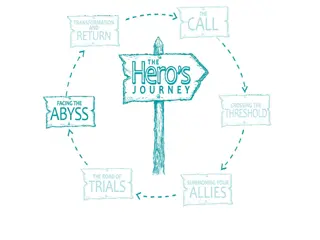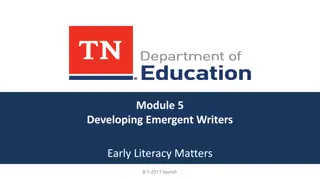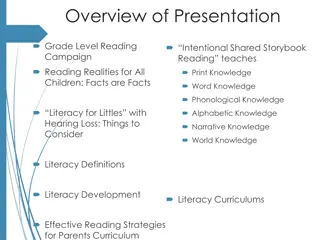Developing Emergent Writers: Early Literacy Matters - Module 5 Overview
Explore activities to develop writing skills in young children by focusing on hand-eye coordination, finger strength, and teacher modeling. Learn to create age-appropriate writing activities in a literacy-rich classroom environment. Aligns with the Read to be Ready Campaign's beliefs on the importance of early literacy.
Download Presentation

Please find below an Image/Link to download the presentation.
The content on the website is provided AS IS for your information and personal use only. It may not be sold, licensed, or shared on other websites without obtaining consent from the author. Download presentation by click this link. If you encounter any issues during the download, it is possible that the publisher has removed the file from their server.
E N D
Presentation Transcript
Module 5 Developing Emergent Writers Early Literacy Matters 8-1-2017 launch
Module 5: Developing Emergent Writers Module 5 at a glance In Module 4, you considered ways learning spaces and activities provide valuable opportunities for scaffolding and supporting listening, speaking, vocabulary, and phonological awareness skill development. In this module, you will: Explore specific activities for developing hand-eye coordination, finger and hand muscle strength, and left-to-right directionality needed for writing. Gain a better understanding of the important role of teachers in modeling meaningful purposes for writing. Learn how to create age-appropriate activities to develop emergent writing skills. 2
Learner Outcomes for Module 5 Learner Outcomes: LO1: Learners will describe the ways fine motor activities prepare children for writing. LO2: Learners will describe the role teachers play in modeling purposeful writing and in providing opportunities for children to experiment with writing tools. LO3: Learners will create age-appropriate activities to develop emergent writing skills for children in their classroom. 3
Connections to the Read to be Ready Campaign: This module aligns to the current Read to be Ready Campaign s following key beliefs: Early Literacy Matters: Teachers are critical: It takes a community: Video link to Early Literacy Matters from Read to be Ready Website: https://www.youtube.com/watch?v=60J8qRjRPkE 4
Module 5 Overview Overview: Module 5 will consist of 3 instructional presentations. These presentations will help you reflect on the special role a literacy-rich classroom environment plays in providing opportunities for children to develop emergent writing skills and interest in writing tools and materials. In Presentation 1, you will learn the importance of providing activities for children to develop muscles for hand-eye coordination, finger control, hand muscle strength, and left-to-right directionality. These skills physically prepare children for writing. In Presentation 2, you will focus on the important role teachers play in modeling the use of writing tools and meaningful purposes for writing. In Presentation 3, you will examine developmentally appropriate activities for developing emergent writing skills for children in the classroom. Following each presentation, you will have the opportunity to apply your learning through Application Activities included in the Learning Guide. 5
Suggested Timeline for Completing Module Modules contain 4 short presentations that are designed to be completed during relaxed ratios or other times as set by your school or agency. Your director or program coordinator may suggest or establish a timeline for each presentation to be completed within the module. Please take a moment to confirm your site s requirements while noting the submission deadline for the final Learning Application Assignment that you will submit electronically to your literacy coach for feedback and support. All other completed activities will remain in your participation guide and available for your coaches review. Section 1: Start at beginning of module and complete Presentation 1 and Practice Activity 1. Section 2: Complete Presentation 2 and Practice Activity 2. Section 3: Complete Presentation 3 and Practice Activity 3. Section 4: Complete the Learning Application Assignment for Module 5 and submit it electronically to your literacy coach for feedback and support. 6
Module 5: Learning Application Assignment This Learning Application Assignment synthesizes all three learning outcomes and all parts will be submitted electronically to your literacy coach for feedback and support. For the first part of this assignment, you will: Choose an activity or learning center in your classroom to promote developmentally appropriate fine motor skills. What kinds of fine motor skills will you add? Add at least two. How will you incorporate books into the area? How can you connect activities to the books included? For example, lacing cards could represent book characters. Intentionally plan your teacher-child interactions to introduce children to the activities. When planning, consider the following: What objects, pictures, or label cards could you add for children to explore and encourage them to write about? How can books be used to build knowledge? How do books connect to interest in writing? 7
Module 5: Learning Application Assignment For the second part of this assignment, you will: Photograph or video children engaged in the fine motor activities related to books that you added to a learning center or activity area. View the photos or videos of taken, and Respond to the reflection questions in the Learning Guide: How did the activity help to create interactive, literacy-rich experiences for children? How did intentional teacher-child interactions support fine motor development and interest in writing? What writing skills did the activities build toward? (left-to-right directionality, hand/eye coordination? Pencil grasp? Other?) How did the added books help to build children s knowledge? What concepts were learned? How often did children engage with the activity? How did your own experiences with literacy and enjoyment of books influence the way you introduced the activity to the children? 8
Module 5: Family Tips for Developing Emergent Writing Skills Help families set up fine motor development activities at home. Take a photo of children engaged in a fine motor activity and send it home with instructions on how to set it up at home. Include a description of how this activity helps to build necessary muscles, coordination, and concentration needed for later writing. Encourage families to model purposeful writing to children as they write grocery lists, letters to mail, notes to child to put in the lunch box, etc Families could set up a mini mail station at home where each family member has a mail slot to receive mail. Have paper and pencils available to write and send family members notes or drawings. For families with infants, stress the importance of crawling! 9
Module 5: Family Engagement Piece Family/Home Connections: How will you help families set up fine motor activities for their children at home? What is one way you plan to help families to model writing at home? Share your plan with your director or supervisor to be incorporated into the program documentation of family engagement with early literacy activities. 10
Additional Resources and References Resources: Module 5 Learning Guide Video link to Early Literacy Matters from Read to be Ready website: https://www.youtube.com/watch?v=60J8qRjRPkE Helping Your Child Build Fine Motor Skills https://www.naeyc.org/our- work/families/help-your-child-build-fine-motor-skills Steps to Early Writing https://www.cdd.unm.edu/ecln/Transition/common/pdfs/preschoolReadin essPDFs/2010-6%20ps_ready_news.pdf Learning to Write and Draw https://www.zerotothree.org/resources/305- learning-to-write-and-draw 11
